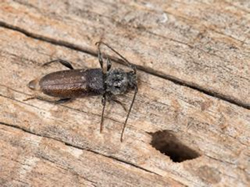 The Department of Primary Industries and Regional Development (DPIRD) is reminding people that winter is the time to clean up any dead or dry pinewood on their properties.
The Department of Primary Industries and Regional Development (DPIRD) is reminding people that winter is the time to clean up any dead or dry pinewood on their properties.
Doing so helps prevent the spread of the European house borer (EHB).
The reminder comes after EHB was detected in the Shires of Waroona, Harvey, and Dardanup in past six months, south of previously known infestations in the greater Perth area.
Technical Area Coordinator at the DPIRD, Jenny Crisp said the Department had a continuing program to manage and contain European house borer.
“EHB is mainly found in dead pine trees, dead parts of living trees and pine logs and other debris. If it is left uncontrolled, it can potentially cause structural damage to homes and restrict the interstate trade of pine products or items on pine pallets,” Ms Crisp said.
“Movement restrictions apply to known infested sites. We also recommend not moving unwanted seasoned pinewood between properties to help prevent spread from unknown sources.”
She said with the onset of cooler weather came the opportunity to clean up and burn unwanted pinewood to protect homes from this wood pest.
“Before burning, the first step is to check the relevant Local Government website for specific burn-related guidelines and permit requirements, or speak to its Fire Officer,” Ms Crisp said.
“Signs of EHB include small oval-shaped holes, which are three to five millimetres, running with the grain of the wood.”
She said the adult beetles were brownish-black, eight to 25mm long, with antennae half as long as their body. They could be found resting on surfaces, such as a wall.
“The larvae are a creamy colour, with a rippled body and enlarged head, which can be found inside pinewood tunnels or galleries,” Ms Crisp said.
Suspected detections of European house borer should be reported to DPIRD via the MyPestGuide Reporter app at this PS News link or to its Pest and Disease Information Service on +61 (0)8 9368 3080.


